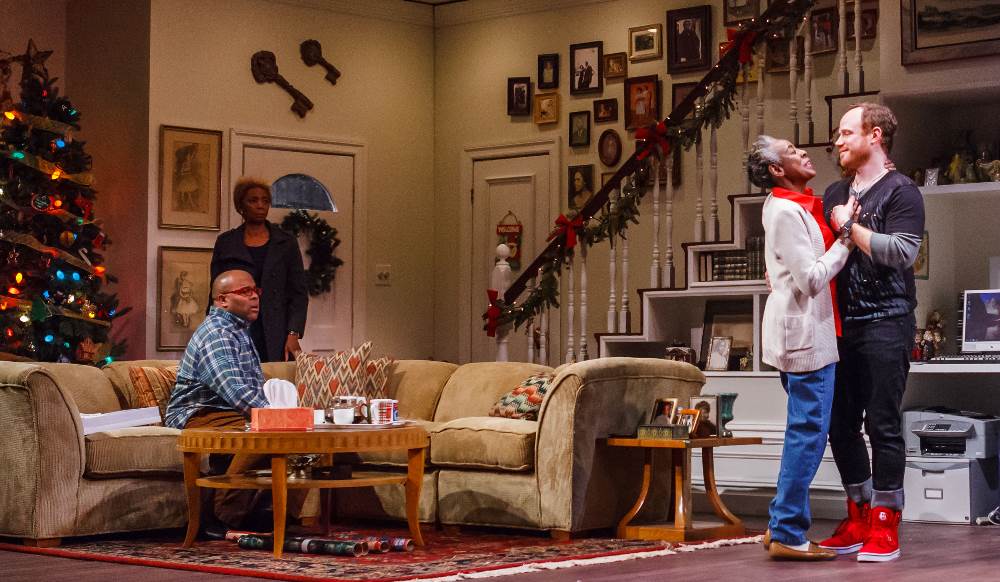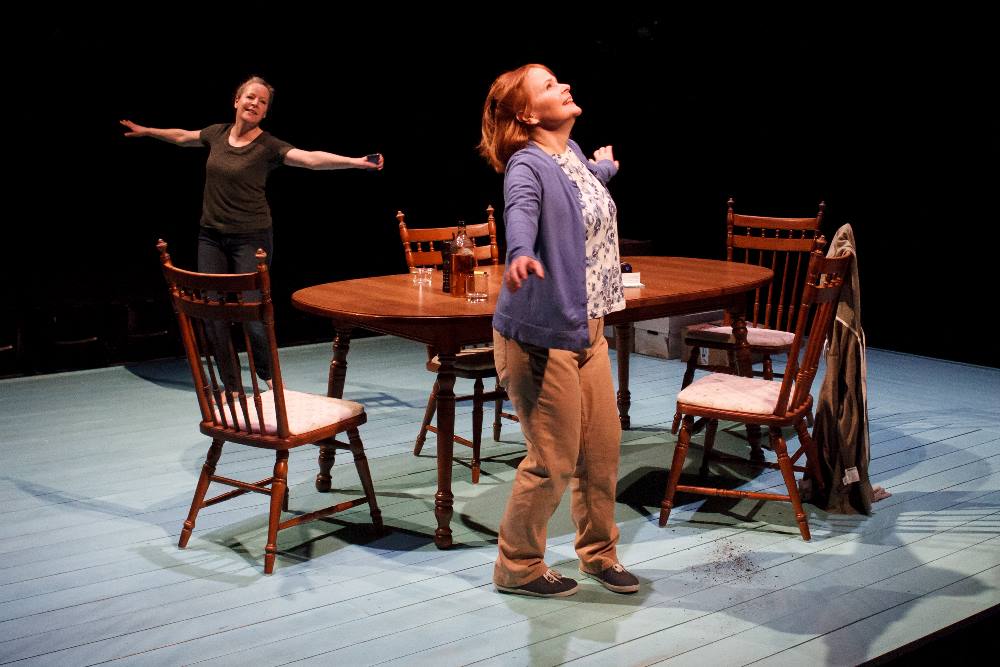LOUISVILLE, KY.: The Humana Festival of New American Plays can be described in exactly eight words, courtesy of director Les Waters: “People have seen some pretty weird shit here.” Indeed, previous years have included SITI Company running around in a circle for 10 minutes and Rude Mechs showcasing full-frontal male nudity alongside balloons.
This year was no exception. To wit: Festivalgoers this year witnessed a five-foot dildo emerging through a glory hole, a sad rhinoceros puppet galumphing across the stage on a chain, blood spraying against a wall and seeping into a snow white carpet. Perhaps more shocking was the sight of Waters, Actors Theatre of Louisville‘s artistic director, making his professional acting debut, and not just to make a turn-off-your-cell-phone announcement. “I’ve never wanted to act,” says Waters. “Who exactly I am [playing], I don’t know.” The elliptical answer is appropriate for the play that Waters appeared in—but more on that later.
The Humana Festival, produced by Actors Theatre, completed its 39th year on April 12. The centerpiece of the month-long event is the world premiere of five fully produced plays and two short-play anthologies. And during the festival’s last two weekends, seemingly the entirety of the American theatre field—playwrights, artistic directors, casting directors, journalists, theatre junkies—descends on this mid-sized Kentucky city to fill the bars, restaurants and lobby of Actors Theatre. And in just three days, most of those people see a total of seven plays. Netflix may have popularized binge TV-watching, but Humana has a lock on the stage version.
With a track record that includes three Pulitzer-winning plays and a roster that includes world premieres by Donald Margulies, Tony Kushner, Sarah Ruhl, Branden Jacobs-Jenkins, A. Rey Pamatmat and Jennifer Haley, Humana remains a career milestone for playwrights.
“Doing a show at the Humana Festival makes you feel like, Oh, I’m actually a playwright,” says Colman Domingo, whose play Dot marks his Humana debut; it received a standing ovation during the second industry weekend. Even with major New York productions under his belt—his work has been staged at the Public Theater, and Dot will appear next fall at Vineyard Theatre, directed by Susan Stroman—Domingo says of Humana, “Something about this really solidifies me. The history and the legacy of it makes you feel like, Yes, I am part of this tradition truly.”

The closing industry weekend can feel like one big college reunion; a simple cocktail party can become a microcosm of the American theatre. In one corner, you might be talking to playwright Lucas Hnath, who is standing next to Clubbed Thumb artistic director Maria Striar when playwright Rolin Jones taps Hnath on the shoulder to say, “We’re going to a bar after this, you should come.”
Or you might be hanging out at the bar at Actors Theatre and James McNeel, the managing director of City Theatre Company in Pittsburgh, will offer to buy you a drink. Or you may run into Adrienne C. Moore (who acted in Dot) and tell her how much you love her as Black Cindy on “Orange is the New Black.”
“I thought that having a year where I don’t have a play, I could just coast on through it. But it’s still just as intense as when I had one on!” exclaims Hnath, whose play The Christians premiered at the 2014 Humana Festival to much acclaim. “You just see so many people you know that you haven’t seen in ages, there’s so many things to catch up on.”
That camaraderie extends to the relationships between the festival playwrights and acting company. The feeling is a kind of inter-play support rather than a competition to see whose play gets the most applause or is most likely to get future productions.
“You feel competitive because you’re a competitive person—if you are and I am,” admits director Kip Fagan, whose direction of Erin Courtney’s I Will Be Gone marks his third Humana credit. “But that’s not what this festival leaves you with. It’s such a supportive environment and everybody—all the directors, writers and actors—are rooting for each other so hardcore.”
“There’s zero sense of competition,” says Mike Donahue, making his Humana directing debut with Jen Silverman’s The Roommate. “It just feels very easy with everybody because all of the pieces are so different stylistically. I think it’s hard to get bogged down in the game of trying to compare them, even if you wanted to. They each sort of exist on their own term.”
For any playwright who receives a slot in the Humana festival, the development process is like the normal development process, but on steroids. A typical process goes something like this: write play, have reading, workshop play, rewrite play, repeat ad nauseum until a theatre commits to producing play…then start rewriting. By contrast, a Humana process can go like it did for Silverman’s Roommate. She finished the first draft last May at SPACE on Ryder Farm, found out it would be at Humana by October and then had a workshop the following month. “They were also like, ‘Congratulations—you need to design the set in the next two weeks,'” Donahue recalls. “It was a wonderfully compressed process, actually.”
The Roommate, a two-hander, is about a divorced mother in her 50s living in Iowa, who puts out an ad for a roommate. The woman who answers is her polar opposite, a pot-smoking, leather-jacket-wearing, vegan from the Bronx. The play explores the collision that happens between these two different women, and how a new friend can reinvigorate a formerly direction-less life. And there’s a dash of Thelma and Louise–style law-breaking as well.
”This is like the first time I have written a play and within less than a year developed it with a production in mind, with an eye towards really seeing the play on its feet,” says an awed Silverman. “What I really appreciate is that Actor’s Theatre accepted a play that they knew to be a first draft. They took a monumental risk on me as an artist, who they had no prior relationship to, and this play.”
If anything, Domingo experienced an even faster turnaround: He says he received word that Dot would be done at the festival just 36 hours after he submitted. “It was possibly the quickest decision that was ever made in American theatre,” he says.
Whereas Roommate explores the inner lives of women in their 50s, Dot takes a wider view, primarily exploring a mother of three who is going through early dementia. She’s not the only character going through a major transition: Her gay son is grappling with how to age gracefully into his 40s, when so much of gay culture is predicated on tight bodies in tank tops, and her oldest daughter has to face becoming their mother’s primary caretaker.
It’s the stuff that living room dramas are made of, except for the fact that this particular drama features a middle-class African-American family, a demographic that is still relatively rare on the American stage. “I wanted to make sure that it was an inner-city family, a middle-class family that still lives in this neighborhood that’s been in decline,” says Domingo, recalling how his own family was middle class. “It’s very important to show a play through that lens. I don’t recall many plays that deal with families in that demographic.”
The same need to represent an underrepresented demographic was the impetus for The Roommate. Silverman says she felt a need to write for a very specific type of female actress.
“When I go to the theatre, I rarely see any roles for women of that age range that are not supporting roles,” Silverman explains. “When I do see older women onstage, or women in their 50s or 60s onstage, those women are generally just there. So I really wanted to write a play for badass women in their 50s.”

Giving stage time to seldom heard voices is an active goal of the Humana Festival. If there is one theme that can connect the Humana plays, it is diversity—aesthetic as well as demographic. “What we do strongly believe in is we have to be passionate about the material and we have to get a diversity of voices and a diversity of form out there,” says Waters.
Even the most straightforward play at this year’s Humana, Erin Courtney’s I Will Be Gone, deals with ghost hauntings within a structure that is less linear than collage-like. It was not an easy play to direct, according to Fagan. “The tone was sort of elusive and the structure is elliptical and not readily apparent,” Fagan explains. “When I was first experiencing the play, I understood it a little bit, but not at all to the extent that the play provided.”
While Dot and The Roommate both confront aging, I Will Be Gone looks squarely at death—or rather, at what happens when life ends and the people left behind are faced with grief and the reminder of their own mortality. The play follows a 17-year-old who moves in with her aunt after the death of her mother and starts to experience hauntings from a nearby ghost town.
The haunting may or may not be real; Courtney won’t show her hand either way. “Some people believe that there are ghosts in the play and some people believe it’s one imagination and circumstance,” she says. “So in my mind, as the playwright, within the world of the play, there’s space for both, depending on who you are as an audience member.”


